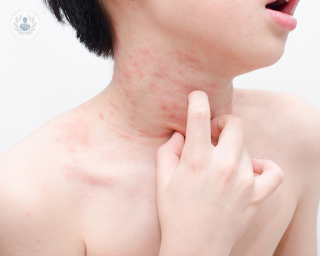What is allergic urticaria?
Allergic urticaria is a skin disease that shows up as a skin rash (white or red hives) and itchiness across the body. It tends to be more common than cases of non-allergic urticaria, where symptoms tend to disappear within a few hours, as there is an allergen triggering it.

What is the prognosis of allergic urticaria?
Urticaria or hives can be a bothersome condition, although in most cases it is harmless. In contrast with chronic urticaria, which can last for months or even years, the symptoms of allergic urticaria disappear within a few days. Nonetheless, it is advisable to see an allergist in order to get a proper diagnosis.
What are the main symptoms?
Urticaria symptoms tend to include itching and swelling or inflammation of the skin surface, as well as an outbreak of red welts with defined edges. These welts tend to appear and disappear, and can sometimes even spread and create a raised skin area.
How is allergic urticaria detected?
Hives can normally be diagnosed by a specialist just by looking at them. Sometimes it may be necessary to take a biopsy and blood test in order to confirm an allergic reaction and to know the reason for the urticaria.
What causes it?
When there is an allergic reaction, the body releases histamines and other chemicals that cause itchiness, swelling, and other symptoms. Some substances that could trigger hives to break out include:
- animal hair
- insect bites or stings
- medications
- pollen
- foods, especially seafood and fish, although it is also quite common to have a reaction with nuts, eggs, and milk.
Other things that could cause an outbreak are emotional stress, extreme exposure to heat or cold, a variety of diseases and infections, and exposure to water among others.

How can it be prevented?
In order to prevent hives breaking out, it is important to have allergy tests done to identify what substances may cause an allergic reaction. It is recommended that exposure to these substances is avoided in order to not have an outbreak of urticaria.
How is allergic urticaria treated?
In some cases, treatment is not necessary as the reaction has gone away on its own. However, treatment normally involves antihistamines and corticosteroids administered under medical supervision. Patients are advised to avoid hot showers on the affected area and to not wear tight clothing, as this can cause irritation.
In cases where the allergic reaction is severe, epinephrine (adrenaline) or steroids may be injected.
Which specialist treats allergic urticaria?
An allergist is the specialist who can diagnose and treat allergic reactions and the underlying allergy involved.
When is allergic urticaria considered a medical emergency?
It is considered to be a medical emergency when skin rashes are found by a doctor or noticed by a patient in the throat, tongue, and/or lungs. If allergic urticaria is found in these parts of the body, the patient will likely experience difficulty breathing, which is considered to be a medical emergency.
What underlying conditions might allergic urticaria be a sign of?
Thyroid disease, hepatitis, lupus, vasculitis, as well as urinary tract infections are all underlying conditions that usually lead to allergic urticaria.
11-13-2012 10-18-2023Allergic urticaria
What is allergic urticaria?
Allergic urticaria is a skin disease that shows up as a skin rash (white or red hives) and itchiness across the body. It tends to be more common than cases of non-allergic urticaria, where symptoms tend to disappear within a few hours, as there is an allergen triggering it.

What is the prognosis of allergic urticaria?
Urticaria or hives can be a bothersome condition, although in most cases it is harmless. In contrast with chronic urticaria, which can last for months or even years, the symptoms of allergic urticaria disappear within a few days. Nonetheless, it is advisable to see an allergist in order to get a proper diagnosis.
What are the main symptoms?
Urticaria symptoms tend to include itching and swelling or inflammation of the skin surface, as well as an outbreak of red welts with defined edges. These welts tend to appear and disappear, and can sometimes even spread and create a raised skin area.
How is allergic urticaria detected?
Hives can normally be diagnosed by a specialist just by looking at them. Sometimes it may be necessary to take a biopsy and blood test in order to confirm an allergic reaction and to know the reason for the urticaria.
What causes it?
When there is an allergic reaction, the body releases histamines and other chemicals that cause itchiness, swelling, and other symptoms. Some substances that could trigger hives to break out include:
- animal hair
- insect bites or stings
- medications
- pollen
- foods, especially seafood and fish, although it is also quite common to have a reaction with nuts, eggs, and milk.
Other things that could cause an outbreak are emotional stress, extreme exposure to heat or cold, a variety of diseases and infections, and exposure to water among others.

How can it be prevented?
In order to prevent hives breaking out, it is important to have allergy tests done to identify what substances may cause an allergic reaction. It is recommended that exposure to these substances is avoided in order to not have an outbreak of urticaria.
How is allergic urticaria treated?
In some cases, treatment is not necessary as the reaction has gone away on its own. However, treatment normally involves antihistamines and corticosteroids administered under medical supervision. Patients are advised to avoid hot showers on the affected area and to not wear tight clothing, as this can cause irritation.
In cases where the allergic reaction is severe, epinephrine (adrenaline) or steroids may be injected.
Which specialist treats allergic urticaria?
An allergist is the specialist who can diagnose and treat allergic reactions and the underlying allergy involved.
When is allergic urticaria considered a medical emergency?
It is considered to be a medical emergency when skin rashes are found by a doctor or noticed by a patient in the throat, tongue, and/or lungs. If allergic urticaria is found in these parts of the body, the patient will likely experience difficulty breathing, which is considered to be a medical emergency.
What underlying conditions might allergic urticaria be a sign of?
Thyroid disease, hepatitis, lupus, vasculitis, as well as urinary tract infections are all underlying conditions that usually lead to allergic urticaria.


Cow’s milk allergy in infants: are the current guidelines causing an overdiagnosis?
By Dr Robert Boyle
2025-01-20
There is increasing evidence across Europe suggesting that children are being overdiagnosed with a cow's milk allergy due to inaccurate information being promoted by the current allergy guidelines. Dr Robert Boyle, one of our top allergy specialists, explains why many parents may falsely believe their child has a cow's milk allergy and how private formula manufacturers might be profiting from this. See more


Inflammatory skin diseases explained by a specialist
By Dr Ravi Ratnavel
2025-01-20
Leading dermatologist Dr Ravi Ratnavel shares his professional expertise on inflammatory skin disease, common and uncommon inflammatory skin conditions as well as prevention and treatment. See more


When is urticaria serious?
By Professor George Du Toit
2025-01-19
Urticaria, also known as hives, is common in childhood. In this article, Professor George Du Toit gives an overview of the different types of urticaria, what to expect, and what treatment looks like. See more


Allergic urticaria in children: How is it treated?
By Dr Tom C Dawson
2025-01-16
Allergic urticaria, commonly known as hives, is a skin condition that causes red, itchy welts to appear on a child’s skin. This reaction can be triggered by various allergens, such as foods, medications, insect bites or environmental factors like pollen. While the condition can be uncomfortable, it’s usually temporary and can be effectively treated. Here to provide a detailed look at this topic is leading consultant paediatrician Dr Tom C Dawson. See more
Experts in Allergic urticaria
-
Professor Adam Fox
Allergy & immunologyExpert in:
- Food allergies
- Child allergies
- Asthma
- Allergic rhinitis
- Allergic urticaria
- Anaphylaxis
-
Professor George Du Toit
Paediatric allergy & immunologyExpert in:
- Food allergies
- Asthma
- Hay fever
- Drug allergy
- Allergic urticaria
- Eczema
-
Dr Lee Noimark
Paediatric allergy & immunologyExpert in:
- Food allergies
- Allergic urticaria
- Asthma
- Allergic rhinitis
- Drug allergy
-
Dr Bhupinder Singh Sihra
Allergy & immunologyExpert in:
- Allergy testing
- Asthma in children
- Anaphylaxis
- Allergic urticaria
- Respiratory diseases
- Wheezing
-
Dr John Reed
DermatologyExpert in:
- Allergic urticaria
- Angioedema
- Skin allergies
- Skin cancer
- Moles
- Allergy testing
- See all

Derma Reading
Derma Reading
Shepherds Hill, Woodley, RG6 1FE
No existe teléfono en el centro.
By using the telephone number provided by TOP DOCTORS, you automatically agree to let us use your phone number for statistical and commercial purposes. For further information, read our Privacy Policy
Top Doctors

Guy’s and St Thomas’ Private Healthcare
Guy’s and St Thomas’ Private Healthcare
Guy’s Hospital, Great Maze Pond
No existe teléfono en el centro.
By using the telephone number provided by TOP DOCTORS, you automatically agree to let us use your phone number for statistical and commercial purposes. For further information, read our Privacy Policy
Top Doctors

Sussex Premier Health Eastbourne
Sussex Premier Health Eastbourne
Eastbourne District General Hospital, Kings Drive, Eastbourne, East Sussex
No existe teléfono en el centro.
By using the telephone number provided by TOP DOCTORS, you automatically agree to let us use your phone number for statistical and commercial purposes. For further information, read our Privacy Policy
Top Doctors
-
Derma Reading
Shepherds Hill, Woodley, RG6 1FE, ReadingExpert in:
- Acne
- Skin Cancer
- Paediatric Dermatology
- Moles
- Aesthetic Medicine
- Hair loss
-
Guy’s and St Thomas’ Private Healthcare
Guy’s Hospital, Great Maze Pond, SE1 South Bank LondonExpert in:
- Allergy
- Cardiology
- General Surgery
- Maxillofacial Surgery
- Thoracic Surgery
- Maternity care
-
Sussex Premier Health Eastbourne
Eastbourne District General Hospital, Kings Drive, Eastbourne, East Sussex, EastbourneExpert in:
- Cataracts
- Eyelid surgery
- Joint preservation surgery
- Women’s health
- Urology
- Most viewed diseases, medical tests, and treatments
- Immunotherapy
- Child nutrition
- Migraine
- Paediatric rheumatology
- Autoimmune diseases
- Joint pain
- Nutrition
- Endermologie
- Polynucleotides
- Abdominal pain








